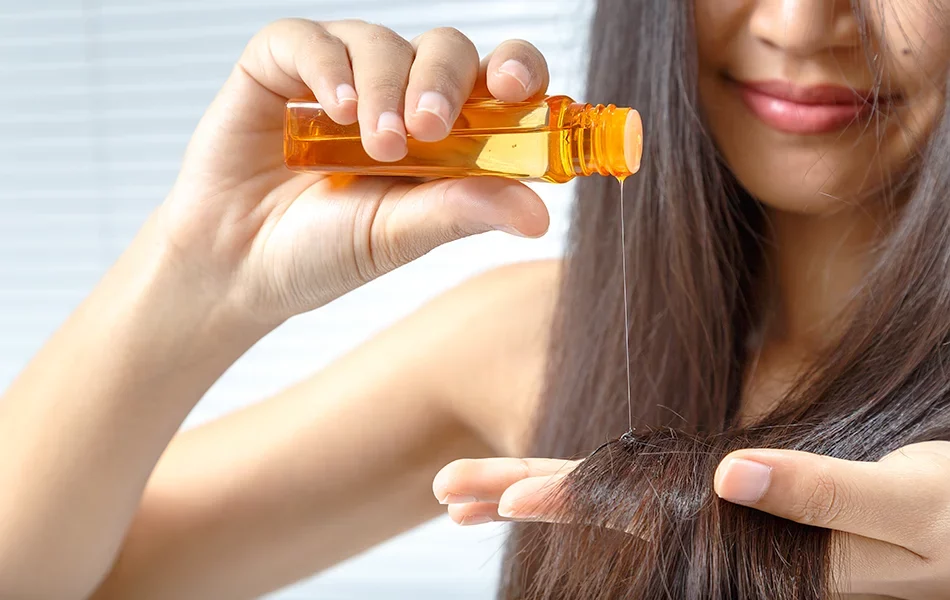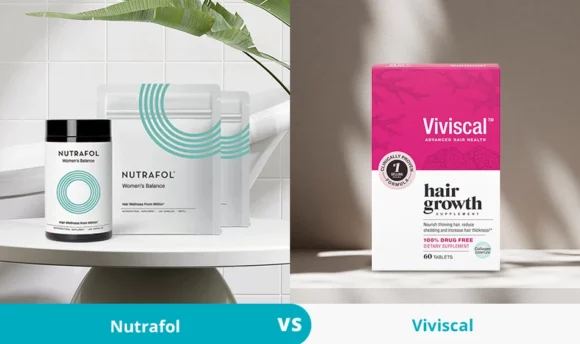Biotin Oil for Hair Growth: Uses and Benefits
Explore the uses of biotin oil, including which types of hair it can help, the benefits, and how you can use it to promote hair growth.

As a type of hair treatment, biotin oil is an oil infused with the water-soluble B7 vitamin, also known as biotin. Alone, the vitamin has several important functions for maintaining strong, nourished, and healthy hair.
But is biotin oil actually effective in encouraging hair growth, or is this simply a myth generated by companies to get you to buy their product? Keep reading to find out everything you should know about biotin oil and whether it could help your troublesome locks.
Does Biotin Oil Help With Hair Growth?
Although using hair oil may create the ideal conditions, it can’t be said for certain that biotin oil itself stimulates hair growth. There is little evidence to suggest that it can penetrate the hair shaft and produce keratin, the protein that makes up your strands.
There have been some studies indicating that failing to get enough biotin into your diet causes hair to fall out or stop growing and that supplementation of the vitamin can help. However, this research is focused on taking biotin vitamins rather than topical application.
If you regularly use an oil that contains biotin, you’ll add moisture to your strands and prevent them from swelling, which is good for hair growth.
Massaging the scalp with biotin oil increases blood circulation to the hair follicles, which can help promote hair growth. It also exfoliates the scalp, which protects against dandruff. Severe dandruff can cause inflammation due to scratching, which slows the rate of hair growth.
Benefits of Biotin Oil on Hair
We’ve mentioned that there’s little supporting evidence for the case of biotin oil for hair growth, but the treatment does have some potential benefits that are important to explore.
These have been summarized below to help you decide whether to invest in this relatively new treatment.
#1 Promotes shiny hair
Like many other oils such as coconut, argan, and castor, applying biotin oil regularly helps to add that extra boost of moisture to your lengths. This prevents it from becoming dry, which gives it that salon shine you’ve been looking for.
#2 Moisturizes scalp
Although the benefits of biotin oil for hair growth are yet to be confirmed, there’s no harm in using oil to make your scalp feel soft, fresh, and nourished. As we’ve mentioned, gently massaging the oil onto your head helps prevent dry and flaky skin, which can cause irritation and lead to dandruff.
When your skin is irritated, there’s nothing you want to do more than scratch it – and the scalp is no exception. Excessive scratching can lead to the scalp becoming inflamed, leaving you with dandruff flakes that can be rectified with a few biotin oil applications.
#3 May prevent hair loss
Despite limited evidence supporting biotin oil as a treatment for hair growth, research does indicate that it may be more useful for treating hair loss.
A study found that 38% of women complaining of hair loss had a biotin deficiency. Although the researchers didn’t directly test whether an oil-based treatment could help resolve this issue, this does highlight the link between hair loss and low levels of biotin in the body.
However, hair loss can be caused by a variety of factors, from androgenetic alopecia to other vitamin and mineral deficiencies. This means that it can be difficult to pinpoint whether or not biotin oil on its own will be useful for your hair loss.
#4 Prevents damage
Using a nourishing treatment such as biotin oil plays an important part in protecting your hair from damage.
Oils can penetrate the hair shaft, reducing the amount of water it absorbs and breaking the cycle of swelling and drying. Known as hygral fatigue, this is a key factor in hair damage.
Biotin oil may be able to fill the gaps between cuticle cells in the hair, which prevents harmful toxins from the environment and other products from entering the follicles. Regular application also lubricates the hair shaft, making it less brittle and less likely to break.
How to Use Biotin Oil for Hair
Applying biotin oil is pretty simple and can easily be added to your haircare routine.
Use the oil as a leave-in treatment by following the steps below:
- Massage the oil gently into your scalp and through the lengths.
- As an optional extra step, wrap your hair with a towel for 15–20 minutes after applying it to help the oil absorb more effectively into the scalp.
- Repeat this process 1–2 times per week at most.
Applying oil to your hair every day can strip your scalp of its natural sebum and cause it to ramp up oil production, leaving your hair looking and feeling greasy.
Biotin Oil and Hair Type
Along with helping to heal scalp inflammation, biotin oil is particularly great for damaged hair types due to its hydrating, nourishing properties.
As a treatment that’s more on the lightweight side, the oil will benefit those with fine, thin hair as it can penetrate the strands easily. Thicker, coarser locks require heavier products such as coconut oil to tame them.
Biotin oil is also safe for those with dyed hair, as it won’t strip the color.
FAQs
Yes, biotin oil is ideal for dry hair as it helps to rehydrate and moisturize the scalp and lengths.
It isn’t recommended to use biotin oil every day, as it can strip your scalp of its natural oils. Aim to use it just once or twice per week.
If you have a particularly sensitive scalp, biotin oil may cause skin irritation and rashes.
A Word From a Trichologist
There are a variety of ways that you can get an adequate intake (AI) of biotin, which is 30mcg daily. For instance, many foods are naturally rich in biotin, including salmon, eggs, beef liver, sweet potato, and almonds. You could also take the vitamin in the form of a dietary supplement.
Most adults in the US easily meet the AI, consuming between 35 and 70mcg per day. However, you may be at risk of deficiency if you have Crohn’s disease, consume alcohol excessively, have recently used antibiotics, or are pregnant.
This means that your hair could become brittle, weak, and fall out as a result.
From heat damage and tight hairstyles to poor diet and stress, there are many other reasons why your hair may be struggling to grow. Try improving your daily care routine by quitting smoking, drinking more water, and drying your hair with a microfiber towel.
Conclusion
Although it may be useful for those with a vitamin deficiency, there isn’t any evidence to support biotin oil as an effective treatment for hair growth. However, it may help to improve the condition of your locks when used regularly, which helps to reduce your risk of hair loss.
Only apply biotin oil to the scalp 1–2 times per week, as using it more frequently could cause irritation. If your scalp does become inflamed or itchy, stop using the product immediately.

















































 Select your language:
Select your language: 








